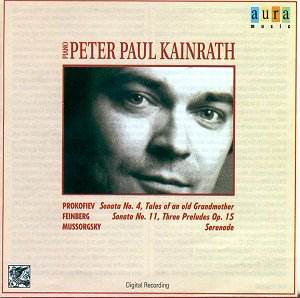Most of the Aura discs I have reviewed recently have
been of historical material. This one, published in 1999, releases a
1994 session made in Ortisei over three days by the Italian pianist
Peter Paul Kainrath, then thirty. A student at the Bolzano Conservatory
he subsequently lived in Moscow for three years studying with Merzhanov,
successor to Samuel Feinberg, himself the focus of interest in this
rewarding disc.
Feinberg, 1890-1962 (the dates are wrong on the Aura
outer casing, but correct in the notes) was pianist, teacher, composer
and writer. Most famous, perhaps, for his Bach – the Well-Tempered Clavier
– and Beethoven he was an active proponent of the contemporary Soviet
literature, notably Scriabin of whom he remained an outstanding advocate
and Prokofiev. Popular in Germany he made an early series of 78s there,
as well as sessions in Moscow – now collected on Arbiter – which succeeded
in defining his aesthetic for the remainder of his life; Chorale Preludes
and Feinberg-transcribed Bach, the Appassionata, Liadov, Scriabin and
Stanchinsky’s Prelude in canon form. His Well-Tempered Clavier is well
enough known and has been intermittently available over the years but
the last recordings, made when he knew he was dying of cancer, possess
a transcendent depth that makes them amongst the most luminous of all
such recordings of the Bach Chorale Preludes. The occasionally rather
brash attack of the younger man had been replaced by a simplicity and
directness that admitted no externalised posturing.
So this disc is a well-chosen exploration of Feinberg
as transcriber, composer and executant virtuoso and opens with the transcription
of the Mussorgsky. Feinberg retains the saturnine, almost hypnotic concentration
of the original song and Kainrath gives it the weight and space to sound.
Feinberg’s Three Preludes were published in 1925. The first, abrupt,
striving, constantly searching for the plateau of legato simplicity
is constantly thwarted whilst the second is more obviously reminiscent
of Scriabin with its moments of stasis and reflection, withdrawal of
tone and the characteristic Feinberg admixture of quasi-Bachian paraphrasing.
The final Prelude is urgent and virtuosic, with an inward looking central
panel that gathers itself for a dynamic and conclusive ending. The Sonata,
a single movement, multi-sectional work was published in 1957 and lasts
sixteen minutes in Kainrath’s performance (roughly the same span as
Prokofiev’s three-movement Fourth Sonata). It functions on principles
of opposition, with contrasting material in frequently abrasive conjunction
whilst remaining tonal and frequently playful. The initial adagio for
example hints at Bach before embarking on some subtle registral examination
and the material is almost obsessively revisited and chewed over. Transformative
incident from 11.00 onwards at first breaks down, with the motoric left
hand simply giving up, before slowly and magically a Bachian Chorale
emerges out of the fragmentary lines. The ending is athletic, vigorous
and triumphant. A compound of Scriabin and hyphenated Bach Feinberg’s
sonata is a welcome retrieval. The disc ends with Prokofiev, of whom
Feinberg was a friend, advocate and colleague. They also frequently
played over music together, trying out works in fourhanded arrangements
(there’s a great deal about Feinberg in Prokofiev’s 1927 Diary, published
by Faber). Kainrath is especially successful in the slow movement of
his Fourth Sonata – Feinberg himself noted in an essay on the composer
the sense of "continuous motion" that the composer cultivated
and that’s precisely the impression Kainrath succeeds in conveying.
Andrea Parisini writes a learned and analytical note
on Feinberg – his biography and musico-compositional leanings. There
is also a reprint of an article by him on Prokofiev. It’s a pity maybe
that the bigger purpose of the disc – the Feinberg exegesis – is only
revealed in the notes but otherwise this is a thought-provoking release
and especially so to admirers of Feinberg - the man and the musician.
Jonathan Woolf


